|
Jamil
Ashraf can barely hide his pride. The 54-year-old Vice President
of Sandhar Locking Devices has returned just the previous evening
from Madurai, where a group of 14 "cluster" companies
had gathered for a review meeting, and he's dying to break the big
news: Sandhar, which supplies locks to two-wheeler companies, is
way ahead of the cluster targets. In fact, its performance has been
so good that the other members, Ashraf says, have asked Sandhar
to go slow and set its own improvement benchmarks. ''We have already
met our second-year targets, which means we have nothing to do for
the next three months,'' says Ashraf, with mock exasperation.
It's been 21 months since the Automotive Component
Manufacturers Association of India (ACMA), with help from the Confederation
of Indian Industry (CII), put together a cluster of companies with
the idea of helping them improve quality, lower costs, and become
more competitive. Tools of their three-year change programme: Total
Productive Maintenance (TPM), Total Quality Management (TQM), and
lean manufacturing. The provocation is obvious: the auto industry,
in India and elsewhere, is going through a bad squeeze in terms
of volumes, prices, and margins. And that pressure is being passed
along the supply chain to vendors, who now have to guarantee year-on-year
price cuts. Those who can't, have no place in the game.
The good news is that at most companies there's
mountain-load of waste to eliminate, starting with things as simple
as shopfloor clutter. And that's resulting in huge savings. Quips
K. Mahesh, Chairman and Managing Director, Sundaram Brake Linings,
and the cluster's muse and mentor: "This is just the tip of
the iceberg."
While the progress reports at these companies
vary, the fundamental transformation-evident in Ashraf's enthusiasm-is
the same: for the first time, they have learnt to question what
they do and how they do it. No mean task considering that more than
300 of the 400-odd ACMA members have less than Rs 50 crore in annual
sales, are largely family-managed, and have little exposure to global
best practices. But as N. Srinivasan, Deputy Director General, CII
Institute of Quality, points out: ''When survival is at stake, there
is a greater incentive to learn.''
Still, a large number of suppliers in the Rs
19,600-crore industry haven't shown any interest in the cluster
initiative. And that's a problem. Says Mahesh: "We'd love to
do a copy *.* command and create at least another 10 clusters, but
I think this is beyond both CII and the ACMA Centre for Technology
(act); the OEMs must chip in too." A willingness to change,
then, is the first necessary step on the long road to world class
competitiveness. And as the following case studies show, a concerned
few are already off the mark.
HI-TECH GEARS
Getting More From Less
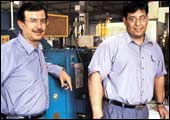 |
| Deep Kapuria (left) and son Pranav: Lean's
new, but passionate, converts |
Messy forge shops
are usually not the places where manufacturing history is made.
But that's not stopping people at Hi-Tech's Bhiwadi factory from
taking a shot at it. In just three months, this manufacturer of
two-wheeler timing gears has scooped out rejections at its forge
shop from a staggering 35 per cent to just 1 per cent. Is that a
record of sorts? Pranav Kapuria, Hi-Tech's 26-year-old Director
thinks so. And as he turns his 106-kg frame-the gym enthusiast can
do a 150-kg bench press-to tell you that, you know better than to
disagree with him.
Jokes apart, Hi-Tech is one of the companies
best placed to break records. For, driving the change at the 16-year-old
company are Pranav and his father Deep Kapuria, who is also the
new President of ACMA. In fact, so profoundly have the Kapurias
been inspired by Mahesh's lean evangelism that Pranav was actually
sent to study at lean guru Dan Jones' Lean Enterprise Research Centre
at Cardiff University Business School. Now, Kapuria Jr is proselytising
the others at Hi-Tech. Says he: "Lean is about innovation,
you need to develop an eye for waste."
Over the last year-and-a-half, Hi-Tech has
done just that. Using cross-functional teams it has worked on improving
its equipment reliability and process flow. There are three model
lines (each representing Hi-Tech's three business units), where
the improvement efforts are focussed. The results have been impressive.
In many cells, production per shift has risen from 1,000 units to
1,500 units; machine shop defects are down from 16,645 PPM to 14,100
PPM and inventory turn ratio (calculated as material cost of sales
divided by raw material plus work in process plus finished good
stock multiplied by 12) is up from 7 to 17. Even machine cleaning
time at one of the model lines has been reduced from almost two
hours to five minutes by implementing a simple suggestion: manufacturer-installed
protective guards were replaced with smaller, touch-free guards,
making the machines more accessible. But the biggest gains have
been in the area of asset utilisation. Hi-Tech's sales have jumped
30 per cent without any additional investment in machinery. Says
Deep Kapuria, MD, Hi-Tech: "The beauty of lean thinking is
that it pushes you to discover ways of doing more with less. After
all, it doesn't make any sense to increase production of the back
on new investment." You bet it doesn't.
SANDHAR LOCKING DEVICES
Leveraging Human Capital
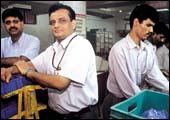 |
| Davar (left) and Ashraf: Setting their
own benchmark |
Jayant Davar is
unlikely to forget the year 2002. Not because it happens to be the
year when his Vice President Jamil Ashraf beat other companies in
the cluster, but because it happens to be the one in which his company
achieved a rare distinction: each of its 700-odd operators had a
high school certificate. "Your operators have to be able to
question and think for themselves; that has to be the foundation
of any lean organisation," says Managing Director Davar, who
started off with a hole-in-the-wall sheet metal unit, 16 years ago.
Investing in human capital-200 of Sandhar's
operators have been trained abroad, and all can operate a computer-has
paid off big time. Sandhar is on a roll. For instance, it had set
itself a defects target of 500 PPM (parts per million) by December,
2002. By August itself, the figure was down to 599. Similarly, productivity
on its model line is up almost 50 per cent to 100 lock sets per
operator per shift. Its secret? Low-cost automation, machine lay
out changes, mistake-proofing of error-prone processes, and better
segregation of sub-assemblies.
Take its raw materials store, for example.
In June this year, Sandhar introduced the supermarket concept here,
whereby some 55 fast-moving components are placed in a U-chain of
carts, and the slow-moving items are put in racks with limited space
(to avoid excessive stocking). The result, Sandhar has been able
to reduce its fast-moving components inventory to just three hours,
and work in process inventory to 0.3 day (or eight hours). Says
Ashraf: ''Now we want to reduce our overall inventory to two days
(from two-to-five days) by the end of this fiscal.''
Surely, part of Sandhar's stunning gains are
due to the relative simplicity of its product line, but a larger
part is due to its relentless push. That explains the 43 per cent
jump in productivity, 100 per cent customer straight pass (read:
no customer rejection), and the rise in value added per employee
(defined as sales minus variable cost divided by total number of
employees) from Rs 4.6 lakh in 1999 to Rs 11.90 lakh in August 2002.
As Davar might say, it's payback time at Sandhar.
UCAL FUEL SYSTEMS
From Good To Better
 |
| Mohanaranganathan at the die casting machine:
The partnership helps, but Ucal is further tightening the
screw on wastes |
Its customers should
be head over heels in love with Ucal. Last year, the carburettor
and fuel injection systems manufacturer gave away almost Rs 10 crore
in discounts to its two-wheeler and four-wheeler customers. The
savings, reveals P.K. Mohanaranganathan, Ucal's Vice President (Operations),
came directly from shopfloor efficiencies. Compared to some other
companies in the cluster, the Rs 176-crore Ucal came with a huge
advantage. Having Mikuni, a Japanese auto comps major, as a 26 per
cent joint venture partner meant that Ucal's Maraimalainagar plant
(near Chennai), set up in 1989, started with cellular manufacturing.
Says R. Sundararaman, Executive Director, Ucal: ''If others had,
say, 45 per cent efficiency during the start of the programme, we
had 65 per cent.''
Therefore, while Ucal's gains may not be as
significant, it has done pretty well for itself. Its customer delivery
is up from 97 per cent to 100 per cent; warranty rejections are
down from 2,000 PPM to 200 PPM; inventory has been hacked to 23
days from 72 days earlier, and the plan is to bring it down to 18
days. Finished goods inventory currently stands at one-and-a-half
days, but Sundararaman wants to pare it to three hours. If things
pan out, he expects the bottomline to rise to Rs 24 crore this fiscal.
That's a 50 per cent jump over last year's. Quips Sarita Nagpal,
a cluster counsellor: "Some of our members have saved so much
money that they don't what to do with it." Now, that's a problem
nobody minds.
SONA KOYO
Opportunity In Adversity
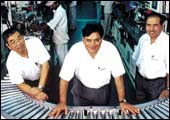 |
| Thinking lean: Kapur (middle) with Deshmukh
(right) and Koyo's Yoshitaka Akiyama |
It is every company's
worst nightmare: Idle manufacturing lines. Yet, at the Gurgaon-based
steering and axle manufacturer, Sona Koyo Steering Systems, there's
no sweat on the brow of its Chairman and Managing Director, Surinder
Kapur, although the line that feeds its biggest customer is at a
standstill. Reason? As a lean practioner, Sona-not part of K. Mahesh's
cluster, but that of TQM-manufactures only against customer order.
If that means having to make 16 deliveries a day-as Sona does in
the case of Maruti-so be it. Says Kapur: ''If you factor in the
inventory carrying cost, the savings of just in time manufacturing
far outweigh the cost of idle machines."
Despite cutting prices of its steering systems
by an average of 3 per cent and battling three consecutive years
of declining sales, Sona more than doubled its profit after tax
last year to Rs 4.77 crore from Rs 1.78 crore the year before. One
of the lines, which had 11 machines and two operators, had historically
taken eight hours for set up change. After making dozens of improvements
and using a cross-functional team, Sona slashed the set up time
to a bare 20 minutes. "That," says Kiran Deshmukh, coo,
''is the power of lean thinking.'' Indeed.
MADRAS ENGINEERING INDUSTRIES
Back From The Dead
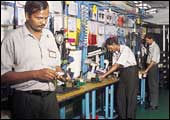 |
| Cutting waste: The automatic slack adjuster
assembly line |
Barely eight years
ago, E.K. Parthasarathy was busy shutting down factories. Today,
the Executive Director of Madras Engineering Industries is scaring
the living day lights out of his Chinese rivals. And even as the
price of slack adjusters (part of an air brake system) that his
Rs 35-crore company makes has been coming down in export markets
from $8 a year ago to $5.5 today, Parthasarathy has increased net
profits by 50 per cent. Incredible, but true. "Over the next
two years, we want a 100 per cent improvement over the situation
prevailing today," says the man, poker-faced.
He isn't being over-ambitious. Two years ago,
by Parthasarathy's own reckoning, "everything was chaotic".
Even packing for exports, which account for nearly 60 per cent of
the revenue, was in a mess. Parts would get mixed up because several
orders were processed simultaneously. Now, a kanban system (it clearly
links parts with the respective order) has simplified packing by
allowing only one crate to be filled up at a time. The use of kanban
for raw material inventory has already brought down stock levels
from 60 days to 13.5 days, and the plan is to lower it to 7.3 days
over the next 12 to 18 months.
There are improvements in other areas as well.
Consider: In the shaft cell, manufacturing time is down to 7.5 days
from 21.53 days; in the body cell, it has been slashed to 0.91 days
from 2.5 days; changeover time has been reduced, for some operations,
to 10 minutes; and the number of operators on a line in the old
Ambattur factory (there's a new one in Maraimalinagar) used to be
33, compared to 16 today. All these are areas where Parthasarathy
is targetting 100 per cent improvement.
FENNER INDIA (MADURAI)
The "Josh" Machine
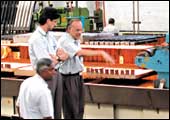 |
| Brainstorming: L.S. Shashiprakasha (gesturing)
at the profile calendering machine |
When L.S. Shashiprakasha
wanted to sell change to the 1,000-odd workers at Fenner's Madurai
plant, he did not roll out any high-priced mass communication exercise.
Instead, he had the workforce broken up into groups of eight or
10, and regaled them with stories from the Mahabharata. Incredibly,
but not for senior gm (Operations) Shashiprakasha, the approach
worked. "More than a thousand improvement suggestions have
come in from our workers in the past four months, only that we don't
have the resources to implement all of them," he points out.
Like the other cluster companies, Fenner-it
makes V-belts and conveyor belts, among others-believes it has got
the basics of good manufacturing (like housekeeping, daily work
management, and machine maintenance) right, and is now closer to
inventory management. The internal rejection rate has fallen by
30 per cent, the lead time for fulfilling export orders has been
crunched to four weeks from 12 to 13 weeks earlier, and the work
in process inventory is a third of what it used to be. Waste elimination
alone has saved Fenner some Rs 2 crore. "Every day improvements
are happening because the cluster initiative has filled our workers
with josh," says Shashiprakasha.
The Rs 260-crore company's turnover has been
stagnating for the last three years because of price cuts. But the
bottomline has actually improved 5 per cent. Shashi-prakasha feels
that 60 per cent of the cluster targets is still to be achieved.
That's good news because every time his men make a small improvement,
they are actually making money.
| "COMPETITION MAKES COMPANIES CLEVER" |
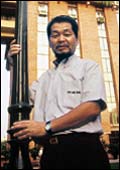 |
| Yamaguchi: The ideas man |
Guess where Sueo Yamaguchi was on his
56th birthday? No, not at home in Japan, but on a podium at
the India Habitat Centre, Delhi, vetting not one or two, but
46 presentations from his TPM cluster companies. But then
you wouldn't expect anything else from a man who is teaching
India Inc. quality. BT's R. Sridharan
buttonholed Yamaguchi recently at CII's first Kaizen
conference. Excerpts:
You've been advising some Indian companies
on TPM since 1998. How do you view their progress?
There's a drastic change. Earlier nobody
used to talk about cost reductions. Now, that's a widespread
concern, because the market condition has drastically changed.
Competition is making companies clever.
What's been the hardest part about
changing the attitude of companies?
The CEO, and the top management. The union
is not a problem. If the ceo is not serious (about change),
how do you get the others to change?
Original product development is still
an issue with Indian companies.
That's because they wait for their joint
venture partners to give them the knowhow. But that can change.
Look at TVS Motor. Earlier its motorcycles were from Suzuki.
Now, Victor is TVS' own idea. Similarly, Sundaram Brake Linings
exports to many countries but has no foreign collaboration.
So, if Indian companies want to do own R&D they must sever
their JV partnerships.
|
|

